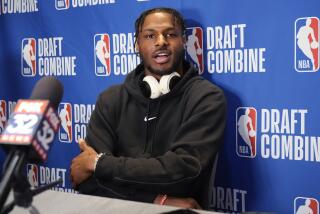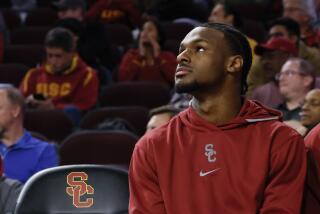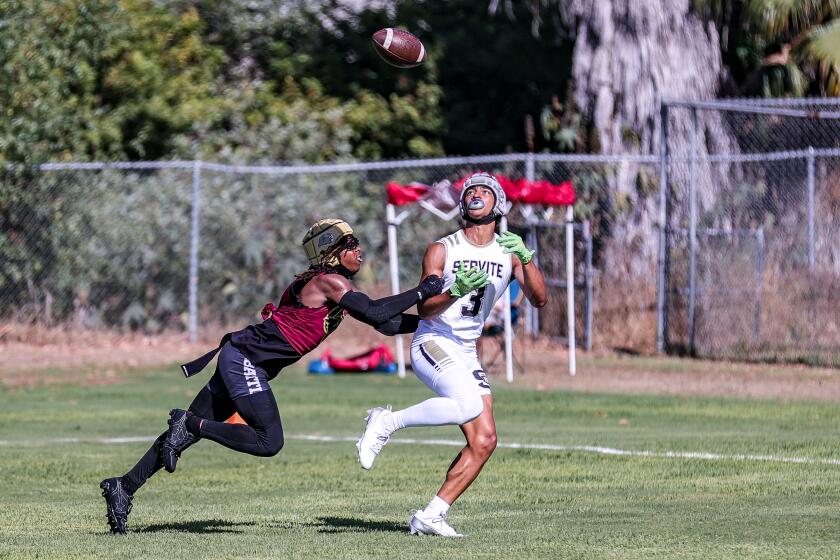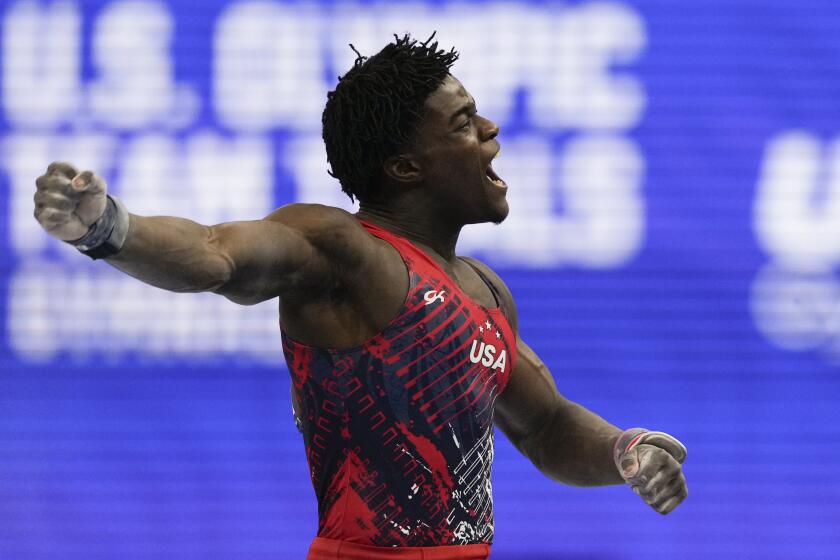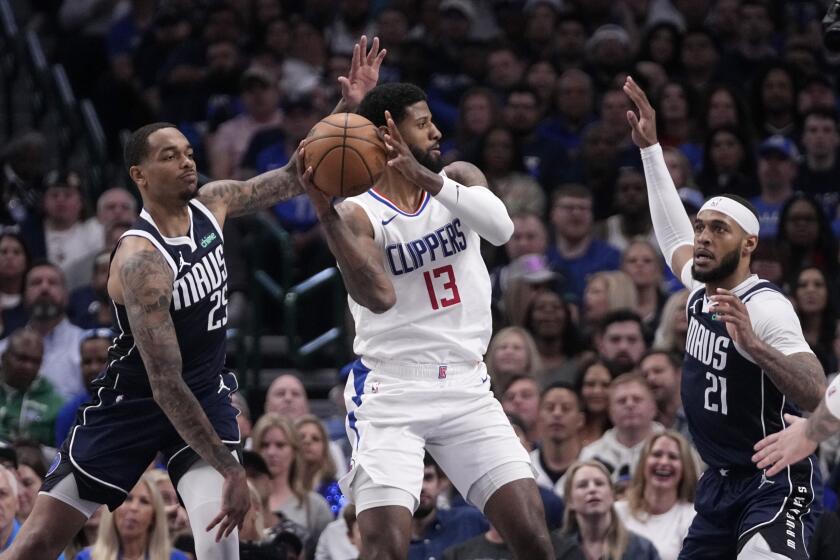How the media helped overturn the NFL’s unwritten ban on black players
On a January afternoon 71 years ago, Halley Harding crowded into a conference room at the Los Angeles Memorial Coliseum and posed a question that transformed the NFL.
The outspoken columnist for the L.A. Tribune, a weekly black newspaper, wanted to know if the Rams would employ black players.
The question, by one account, drained the color from the face of Rams general manager Chile Walsh. He had just pitched the powerful nine-member public commission in charge of the Coliseum on the virtues of the franchise leasing the facility. The NFL champion Rams, approved by league owners three days earlier to relocate from Cleveland to L.A., viewed the 103,000-seat stadium as an ideal home.
But Harding refused to allow the politicians, lawyers and publicity men in the conference room to overlook the NFL’s unwritten ban on black players for the previous 12 years. His impassioned words helped trigger the NFL’s reintegration a year before Jackie Robinson broke major league baseball’s color line with the Brooklyn Dodgers.
The impact from the long-ago episode continues to ripple through the NFL. When the Chargers hired Anthony Lynn earlier this month, the former running back and longtime assistant coach became the franchise’s first black head coach.
“My grandfather, he was around when people were fighting for equal rights and fighting for a chance to vote,” Lynn said. “He told me one day, I think I was a freshman in high school, he came out and watched my practice and said, ‘You’ve got a chance. This world is not always fair, but you need to run faster. You need to understand, but you’re going to have to run faster.’
“Later on in college, I got it. I knew what he meant. I had to outwork the other guy.”
Eight minority head coaches, including Lynn, will start the 2017 season in the NFL. That’s the most in league history entering a season.
“The league has taken a lot of steps to promote and support that,” said John Spanos, president of football operations for the Chargers. “The Rooney Rule [which requires teams to interview minority candidates for certain positions] may be criticized at times, but the spirit of the rule and its intentions are great and I think you’re seeing some of the results of it.”
But the milestone would have seemed all but impossible during the meeting on Jan. 15, 1946. Harding argued that permitting a league that barred blacks to use the publicly owned Coliseum would be nothing less than a retreat from democracy. He called it “singularly strange” that Kenny Washington, the cannon-armed All-American at UCLA regarded as the West Coast’s top player, had never received a tryout with an NFL team. The league, Harding said, stood guilty of ingratitude toward black players like Duke Slater, Fritz Pollard and Joe Lillard, who helped establish the fledgling NFL during the touch-and-go early days.
The frustration echoed a column in which Harding wrote two years earlier: “It seems very queer that a country fighting to uphold its belief in the quotation that ‘every man is created equal, etc.’ would allow two of its strongest publicity selling points, baseball and football, to contaminate our ideals with discrimination for all the world to see and note. Some day, some one has to see the light.”
Harding’s columns tore into anything that seemed unfair, underhanded or, worst of all, discriminatory. He quipped that he couldn’t dress each morning without first putting on boxing gloves to fight bigotry. The onetime Negro Leagues shortstop who suited up for a forerunner of basketball’s Harlem Globetrotters demanded the state investigate anti-black bias at a boxing venue in Hollywood, picketed L.A.’s Wrigley Field, pushed USC to use black players and convinced the L.A. County Council to condemn discrimination in professional baseball.
In the conference room, Walsh protested that no NFL rule, written or otherwise, barred blacks from the NFL. He insisted the league didn’t discriminate, though no black men had suited up since Lillard did so for the Chicago Cardinals in 1933.
“Walsh was really shook up,” Herman Hill, the West Coast editor for the Pittsburgh Courier and the first black basketball letterman at USC, wrote decades later. “He turned pale and started to stutter.”
A third black journalist at the meeting, Abie Robinson of the California Eagle, remembered in an oral history that the exchange left Walsh “bent out of shape.”
Roger W. Jessup, a Coliseum Commission member, asked if a professional team would really refuse to play alongside “our Kenny Washington.” Hill offered a much different version of Jessup’s comment in subsequent years. The question became a threat: “I just want you to know if our Kenny Washington can’t play, there will be no pro football in the Los Angeles Coliseum.”
Whatever Jessup’s actual words, Walsh made an offer.
“We will take any player of ability we can get,” he said. “Kenny Washington is welcome to try out for our team anytime he likes.”
The door cracked open.
::
A week later, Harding and 10 other black newspapermen gathered for cocktails at the Last Word Club on South Central Avenue at Walsh’s invitation. The group didn’t discuss much business. But Walsh, accompanied by publicity man Maxwell Stiles, faced more questions about using black players. One newspaper noted “definite interest” in signing Washington or his former UCLA teammate Woody Strode.
Stiles later opined that Walsh offered to use black players only because he “faced an intolerance fight and the possible loss of his fight to secure the Coliseum if he didn’t agree to take them.”
Harding reported Washington to be “pleased as punch” by the promised opportunity.
“January 15 goes down as another famous first in our book,” Harding wrote. “Another milestone on the way to democracy passed.”
But Washington remained unsigned.
::
Minutes before the Coliseum Commission voted Jan. 29, 1946, to lease the stadium to the Rams, a local radioman named Theodore Bentley asked whether professional football’s color line would cut through L.A.
“Here is one of the greatest football players of all time sitting around and never signed,” Bentley said of Washington, according to a transcript of the meeting. “If they are sincere in their intentions to sign Negro players, why do they permit that?”
Jessup noted Walsh’s pledge to offer tryouts to qualified black players. Then Leonard J. Roach, the Coliseum Commission president Hill credited with facilitating Harding’s speech, distanced the body from compelling the Rams to integrate.
“The policy of the commission as members is very much opposed to any discrimination,” Roach said.
“I quite realize that,” Bentley responded.
“But I think you can see legally we have no power,” Roach said.
When the commission unanimously approved the contract with the Rams, the 10-page pact didn’t include a single word about discrimination or using black players.
::
In March, the Rams announced the signing of Washington during a news conference at the Alexandria Hotel in downtown L.A. Since his days at UCLA on the same team as Robinson and Strode, Washington had served as an L.A. Police Department officer, dabbled in movies and played for the semipro Hollywood Bears in the Pacific Coast League. But this wasn’t the same man whose gridiron dominance at UCLA once earned the headline “Washington beats Washington.”
“His break is coming five or six years too late,” Dick Hyland wrote in The Times. “I believe he was the greatest college back I have ever seen ... [but now] he is a beaten-up ballplayer who is neither so strong nor so quick in his reactions as he was before the war.”
The three-page press release Stiles prepared dismissed the social significance of the signing.
“The National League has never had a rule against the use of Negro players,” the release said, “and no precedent is being set in the signing of Washington, though for one reason and another members of that race have not played in the league since about 1933.”
In a California Eagle column, Stiles attributed the move to an expanded budget following approval of the Coliseum lease.
Strode, whom the Rams added two months later, lasted one season. Washington’s knees forced him to retire after three seasons. His final game on Dec. 12, 1948, became “Kenny Washington Day” in L.A. At halftime, Washington received a 1949 Ford sedan, a television and a $500 savings account for his son.
Harding’s role faded into history. That didn’t always sit well with him. In a characteristically blunt Thanksgiving column one year, Harding complained that “not one word of appreciation has been given by message or word of mouth” by black players who followed Washington into the NFL. He became better known as the business manager for Satchel Paige, the Hall of Fame pitcher.
“There was nothing breezy about the intensity of his campaign,” Charles J. Livingston of the Associated Negro Press wrote after Harding died in 1965 at age 56. “To quote one of his ardent fans, ‘Halley blasted the hell out of ’em.’”
Twitter: @nathanfenno
Times staff writer Sam Farmer contributed to this report.
More to Read
Get our high school sports newsletter
Prep Rally is devoted to the SoCal high school sports experience, bringing you scores, stories and a behind-the-scenes look at what makes prep sports so popular.
You may occasionally receive promotional content from the Los Angeles Times.
